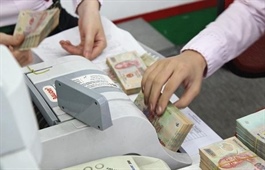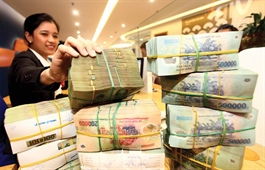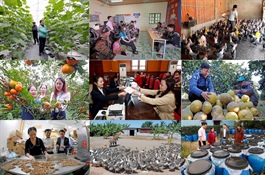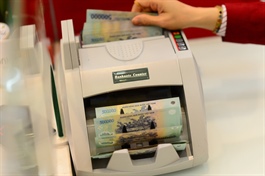Suitable market conditions for carbon credit transactions
Suitable market conditions for carbon credit transactions
Vietnam has made a significant leap in its climate policy by committing to ambitious emission reduction targets. Nguyen Hong Loan, director of Green Climate Innovation Co., Ltd., looks at the importance of carbon credit trading in accelerating the country’s climate actions.
This year is the starting point for Vietnam to operate its carbon credit market on a trial basis towards 2028 without any sales to foreigners, as well as regulations on credit exchanges with regional and global markets.

Nguyen Hong Loan, director of Green Climate Innovation Co., Ltd |
Over the three-year span, international transactions will not be made, except for carbon exchange activities under international agreements. From 2029, the market will be fully operated across the nation, with a study of the ability to link up with international markets.
According to the project, the compliance carbon market will contribute to concretising greenhouse gas (GHG) emissions reduction targets at low costs under the Nationally Determination Contribution (NDC) while creating new financial flows for GHG emissions cut, bolstering green transition and low-emission technologies.
It aims to improve the competitive edge of Vietnamese firms both domestically and internationally, branching out a low-carbon economy, and responding to climate change towards the net-zero target by 2050.
Vietnam has also established a robust legal framework to develop and implement the carbon market as a vital policy tool for attaining these ambitious GHG emission reduction targets. The Law on Environmental Protection prescribes the organisation and development of the domestic carbon market, including trading emission allowances and carbon credits.
Besides that, Vietnam has been actively trading carbon credits in the international carbon market via participation in carbon crediting mechanisms such as the Clean Development Mechanism, the Joint Crediting Mechanism (JCM), and the voluntary carbon market.
To support countries to meet their NDCs, the Paris Agreement allows parties to engage in cooperative approaches under Article 6, of which the JCM that has already been operating in Vietnam is covered, and negotiations between Vietnam and different buyer countries like South Korea and Singapore are ongoing.
High potential
There are different options for carbon credits in Vietnam to be traded in the markets. Decree No.06/2022/ND-CP, dated January 2022 on GHG emission reductions and ozone layer protection, outlines the roadmap for developing and implementing the domestic carbon market. The pilot operation of an emission trading system (ETS) will commence in 2025, with full official operation expected to begin in 2028.
Additionally, regulations for connecting and trading carbon credits with regional and global carbon markets will also be established starting in 2028. There is thus a high potential for projects in Vietnam to participate in the domestic ETS.
The pilot phase of the domestic ETS in Vietnam may cover enterprises from thermal power, cement, and steel facilities. According to Decree 06, facilities can use carbon credits to offset up to 10 per cent of the total allowances.
Currently, carbon credits can be traded freely in the voluntary carbon market to buyers within Vietnam or in other countries. According to Decree 06, the projects covered under such a carbon crediting scheme need to submit registration information and provide annual reports to the Ministry of Natural Resources and Environment.
With the increased awareness and wider adoption of environmental, social, and governance (ESG) practices, enterprises are actively engaging in low-carbon development pathways and buying carbon credits to achieve their voluntary emission reduction targets.
The fact that 87 per cent of the submitted NDCs specify countries’ intentions to possibly use voluntary cooperation under Article 6 confirms a significant interest in carbon transactions under these cooperative approaches of the Paris Agreement. Modelling studies estimate that around 4-5 gigatonnes of CO2e could be traded per year by 2030 with a market volume of $60-100 billion per year if NDCs are transformed into tradable emission mitigation actions.
Such high estimated demand shows a positive signal for the trading of carbon credits from Vietnam to the international carbon market under the Article 6 framework. The transfer of authorised carbon credits under Article 6, however, requires corresponding adjustment with the country’s emission balance to avoid double-counting and ensure the environmental integrity of the carbon credits.
The outlined routes show opportunities that the carbon market can bring to Vietnam. Firstly, the carbon market will incentivise emission reductions. A well-functioning carbon market incentivises businesses to innovate and adopt low-carbon technologies by increasing the cost of emitting GHGs. This market-driven approach encourages companies to invest in energy efficiency, clean technologies, and practices that reduce emissions.
High-emission sectors such as energy, cement, and steel will be motivated to lower emissions through more efficient processes or cleaner fuel sources. Additionally, by allowing companies to trade emission allowances and carbon credits, the carbon market creates flexibility, enabling firms to achieve emission reductions at the lowest possible cost.
A competitive edge
Besides that, the carbon market will contribute to attracting green investments. Transaction of carbon credits in domestic and international carbon markets helps Vietnam to attract foreign and domestic investments in clean energy, green technologies, and sustainable infrastructure. Companies looking to lower their carbon footprints are increasingly seeking markets that offer carbon credit opportunities to offset their emissions.
It also complies with international climate commitments. Vietnam’s carbon market is pivotal in helping the country meet its NDC targets under the Paris Agreement. By establishing an ETS and promoting the transaction of carbon credits, Vietnam aligns itself with international best practices and positions itself to engage in cross-border carbon trading initiatives.
The carbon market also helps to enhance ESG practices. Promoting carbon trading, either through the domestic compliance scheme, a voluntary scheme following independent carbon standards, or the international cooperative approaches under Article 6, will encourage companies to integrate ESG strategies into their business models. This includes reducing emissions, purchasing carbon credits, and contributing to sustainable development. Companies with strong ESG programmes may gain a competitive edge by appealing to environmentally conscious consumers and investors.
On the other hand, the promotion of a market for carbon transactions poses several challenges that Vietnam should consider when devising a carbon market development and participation strategy.
Carbon credits in the post-2020 period can serve multiple purposes. The main concern of Vietnam while engaging in collaborative approaches under Article 6 is overselling risk, which may jeopardise Vietnam’s ability to meet its NDC targets. Striking a balance between retaining carbon credits within the country to achieve its NDC and selling them to create an additional revenue stream from the international carbon market is a challenging task.
It is thus necessary to develop an effective approach for the management of carbon credits through modelling studies and impact assessment for different governance options to provide a sound evidence-based background for decision-making and the promulgation of an appropriate strategy.
Moreover, government agencies, businesses, and stakeholders will need training to navigate the intricacies of carbon trading, monitoring, reporting, and verification systems, and carbon credit certification. The guidance for international trading under Article 6 should also be finalised at the international level and transferred into specific regulations, procedures, and guidance at the national level.
Vietnam’s efforts to develop a carbon market present a critical opportunity to align the country’s economic growth with its climate goals. The carbon market has the potential to attract investment, foster innovation, and drive emissions reductions across key sectors. International transfer of carbon credits can leverage the efforts and create additional revenue streams for Vietnam to raise its ambition.
By overcoming these challenges, Vietnam can better support global climate action while transitioning to a more sustainable, low-carbon economy.
























